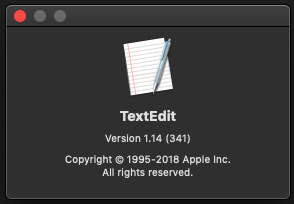Of all the common meta-commands related to game information—HELP, VERSION, CREDITS, HINTS, etc.—the only one I find myself pondering is ABOUT.
I’m wrapping up my first game, and one of my last tasks remaining is to write an ABOUT. I sampled a few games to see how other authors tackled this:
- Mike Carletta’s The Song of Mockingbird mentions the game was written for IF Comp 2021, it’s Zarfian rating, a few general hints, some thanks, and the game’s license. It’s the same as its
CREDITSresponse. - Ian Finley’s Babel also lists its
CREDITS. - Eric Eve’s Nightfall opens a menu with instructions, hints, credits, and a README.
- mathbrush’s Absence of Law
ABOUTis written using an in-game voice, with a dedication, tester thanks, and music credits. It too is the same as itsCREDITresponse. - Emily Short’s Counterfeit Monkey uses a menu system with some custom entries, including an introduction, game-specific commands, credits, and how to contact her. (This game is also the only one I found that doesn’t have a
CREDITScommand, or at least one available at the start of the game.)
From this variety, I assume there’s no pat template for ABOUT. Most simply display their CREDITS or use what appears to be a stock menu with some customized entries. (A standard Inform library, perhaps?)
My current thinking is to write a personal message thanking people and offering general tips specific to the game. My CREDITS command is more like a copyright page, in that it’s a bit dry, listing credits, version numbers, and license information. For ABOUT, I’m currently leaning toward Mike Carletta’s style.
Does anyone have any sage advice on their approach to writing an ABOUT for a parser-based game that’s not merely printing CREDITS or opening an instruction menu? Or know of a game with a unique approach to it?


